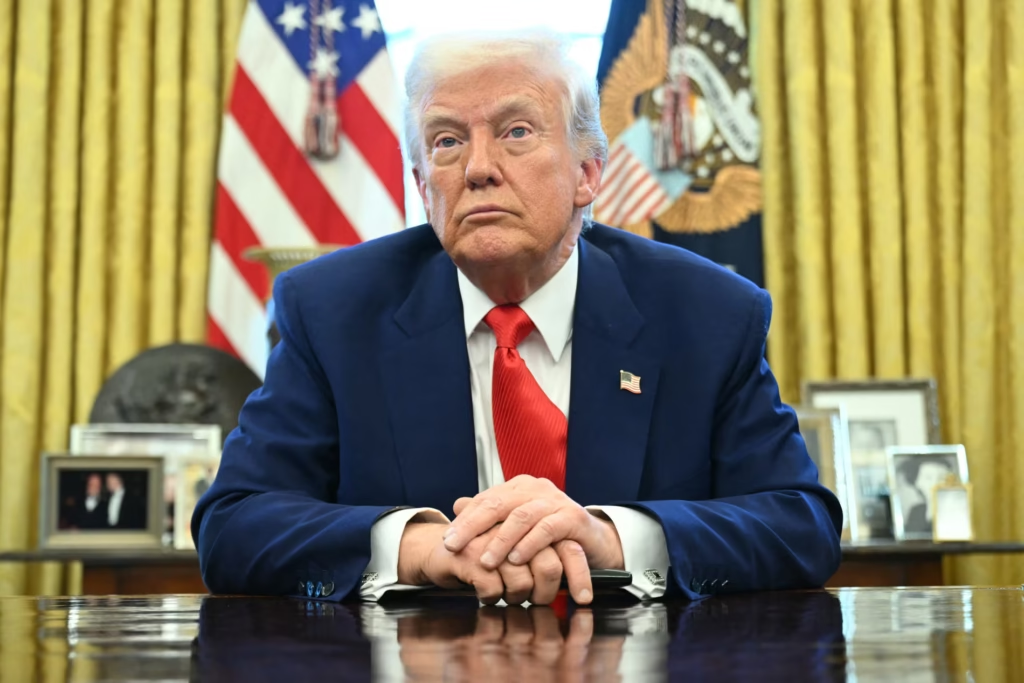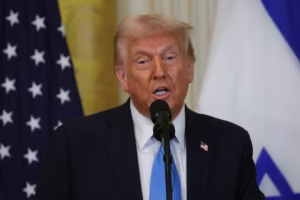
As the economic and political pressure became unbearable, the US president changed course – but has the damage been done?
He vowed: “My policies will never change.” He insisted: “Sometimes you have to take medicine to fix something.” He boasted: “I know what I’m doing.” And at 9.33am on Wednesday, he entreated: “BE COOL. Everything is going to work out well.”
But less than four hours later, Donald Trump blinked. As the economic and political pressure became unbearable, the US president announced on social media that he would pause for 90 days higher trade tariffs for most countries, excluding China.
It was a dramatic climbdown by a leader who has spent years cultivating the image of a strongman able to project indifference through every storm. White House aides immediately swung into gear, attempting to spin the retreat as the masterstroke of peerless dealmaker and genius chess player.
The damage had been done, however. Damage to America’s standing as an honest broker and dependable ally. Damage to the US dollar and financial system as the world’s anchor of financial stability. And damage to Trump’s reputation on his signature issue, the economy, in the eyes of business leaders, Republicans and voters.
“It’s obviously far too soon to talk about a failed presidency, but to me there are clear indications that Donald Trump’s presidency is endangered,” said Larry Jacobs, director of the Center for the Study of Politics and Governance at the University of Minnesota. “That’s an extraordinary statement for month three, but he’s taken such extreme measures and the responses are unusual, particularly for Republicans. They’re very demonstrative and they’re very directed at his power.”

U.S. President Donald Trump speaks
The past two weeks have witnessed the most volatile period for financial markets since the coronavirus pandemic lockdowns five years ago. This time, however, the cause is not a highly contagious virus but the grievances and whims of one man.
On 2 April, standing in the White House Rose Garden, Trump announced sweeping “reciprocal” tariffs on dozens of countries, billing it as a “declaration of economic independence” on a “liberation day” that would restore America’s “golden age”. After decades of getting ripped off, he claimed, “it’s our turn to prosper”.
The tariffs were calculated based on a country’s trade deficit with the US divided by the value of goods imported from that country. The formula was immediately criticised for inaccuracies and absurdities, such as assigning tariffs to Heard Island and McDonald Islands, which are inhabited entirely by penguins.
Yet in Trump’s telling, the long-threatened tariffs were a necessary measure to restore US manufacturing and address trade imbalances. The Rose Garden event was attended by workers in hard hats and yellow construction vests – a reminder of how Trump has sought to steal Democrats’ identity as the party of the working class.
Some analysts on the left and the right agree that the US industrial midwest was hit hard by globalisation with factories shuttered, communities hollowed out and jobs shipped overseas. But few believe that Trump, who for decades has believed that the US is getting ripped off, and his sledgehammer approach to tariffs are the right solution.
Bill Galston, a senior fellow at the Brookings Institution thinktank in Washington, said: “I have always believed that his understanding of when America was great was in the 1950s and 1960s, when 30% of the workforce was in manufacturing and when the rest of the world was flat on its back and America bestrode the world like a colossus.
“His dream is to restore that America to the greatest extent possible, and he genuinely believes that high tariff walls will force people who are doing manufacturing in China and all across south-east Asia and elsewhere to come here.”
Galston added: “It is, most economists would say, a fantasy that could make a difference at the margins. Right now, manufacturing employment in the United States as a share of the total is 8%, down from its peak above 30% in the 1970s, and that’s not going to be reversed.”
Trump had effectively taken the world economy hostage. The repercussions were immediate and widespread, including market instability, strong international condemnation, retaliatory measures from China and deep uncertainty for businesses and consumers.



